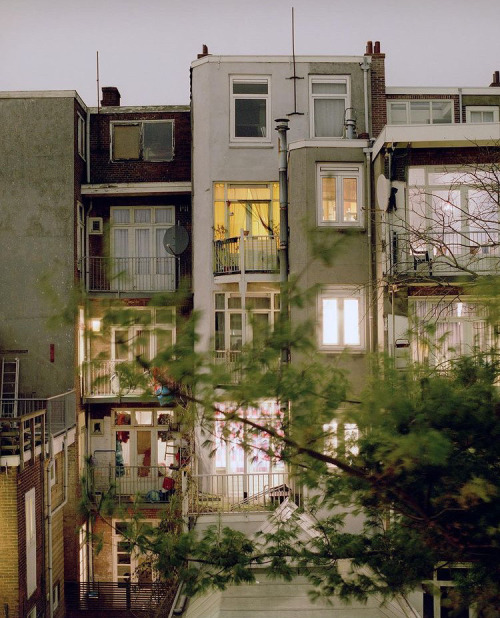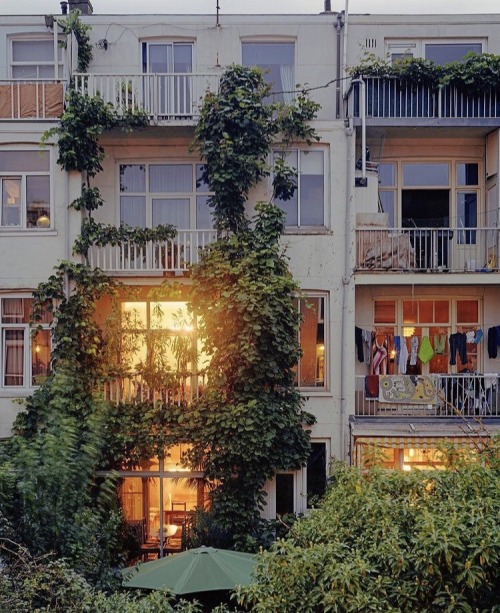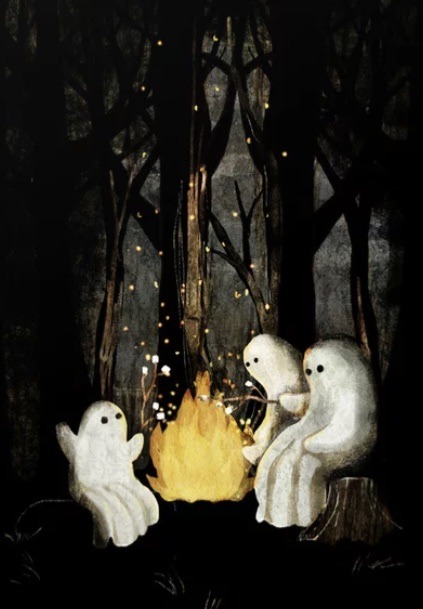‘Rear Window’ By Jordi Huisman




‘Rear Window’ by Jordi Huisman
More Posts from Sohmygodness and Others

Beware!

Sennen Cove, Cornwall, England




Art by Katherine Blower 👻
Something I find incredibly cool is that they’ve found neandertal bone tools made from polished rib bones, and they couldn’t figure out what they were for for the life of them.
Until, of course, they showed it to a traditional leatherworker and she took one look at it and said “Oh yeah sure that’s a leather burnisher, you use it to close the pores of leather and work oil into the hide to make it waterproof. Mine looks just the same.”
“Wait you’re still using the exact same fucking thing 50,000 years later???”
“Well, yeah. We’ve tried other things. Metal scratches up and damages the hide. Wood splinters and wears out. Bone lasts forever and gives the best polish. There are new, cheaper plastic ones, but they crack and break after a couple years. A bone polisher is nearly indestructible, and only gets better with age. The more you use a bone polisher the better it works.”
It’s just.
50,000 years. 50,000. And over that huge arc of time, we’ve been quietly using the exact same thing, unchanged, because we simply haven’t found anything better to do the job.




Pride & Prejudice (2005)
Good Omens | 2.06 - "Every day" (2023)
Clock (Words by William Shakespeare, Read by Neil Gaiman, Music by FourPlay StringQuartet)
Released on World Shakespeare Day 2023, this is Clock, Shakespeare’s Sonnet 12, read by Neil Gaiman and set to a haunting musical backdrop by Australia’s FourPlay String Quartet. Taken from their debut album Signs of Life.
Read by Neil Gaiman Violin & vocals – Lara Goodridge Viola – Shenzo Gregorio Viola & vocals– Tim Hollo Cello & vocals – Peter Hollo




























I have a folder called Time is a Flat Circle in which I collect evidence of humanity. Here is most of them.










William Bradford - Arctic and maritime paintings of polar ice, icebergs and the North Pole. Alas… another fast vanishing world.
My best friend and I had a call recently—she’s back with her family for a bit helping out with some hometown stuff. As part of the stuff, she’s been going through a (deceased) relative’s scrapbook, compiled in the American Midwest circa 1870-1900 and featuring mostly cut-out figures from the ads of the day.
She talked about how painstaking this relative’s work was. (Apparently the relative was careful to cut out every finger, every cowlick; this was by no means carelessly or hastily assembled.) But she also she talked about how—the baby on the baking soda ad is ugly, it is so ugly, why anyone would clip this heinously ugly illustrated baby and paste it into a scrapbook? Why would you save the (terribly told, boring) ghost story that came with your box of soap?
(Why include these things in the first place? we asked each other. ”There’s a kind of anti-capitalism to it,” she mused.)
And we discussed that for a bit—how most of the images, stories, artists, and ads were local, not national; they’re pulled from [Midwestern state] companies’ advertisements in [Midwestern state] papers, magazines, and products. As a consequence, you’re not looking at Leyendecker or Norman Rockwell illustrations, but Johann Spatz-Smith from down the road, who took a drawing class at college.
(College is the state college, and he came home on weekends and in the summer to help with the farm or earn some money at the plant.)
But it also inspired a really interesting conversation about how—we have access to so much more art, better and more professional art, than any time in history. As my bff said, all you have to do to find a great, technically proficient and lovely representational image of a baby, is to google the right keywords. But for a girl living in rural [Midwestern state] of the late 1800s, it was the baking soda ad, or literal actual babies. There was no in-between, no heading out to the nearby art museum to study oil paintings of mother and child, no studying photographs and film—such new technologies hadn’t diffused to local newspapers and circulars yet, and were far beyond the average person’s means. But cheap, semi-amateur artists? Those were definitely around, scattered between towns and nearby smallish cities.
It was a good conversation, and made me think about a couple things—the weird entitlement that “professional” and expensive art instills in viewers, how it artificially depresses the appetite for messy unprofessional art, including your own; the way that this makes your tastes narrower, less interesting, less open.
By that I mean—maybe the baby isn’t ugly! Maybe you’ve just seen too many photorealistic babies. Maybe you haven’t really stopped to contemplate that your drawing of a baby (however crude, ugly, or limited) is the best drawing of a baby you can make, and the act of drawing that lumpen, ugly baby is more sacred and profoundly human than even looking at a Mary Cassatt painting.
And even if that isn’t the case….there was this girl in [American Midwestern state] for whom it was very, very important that she capture every finger, curl, and bit of shading for that ugly soap ad baby. And some one hundred years later, her great-something-or-other took pains to preserve her work—because how terribly human it is, to seek out all the art we can find that resonates with us, preserve it, adore it.
It might be the most human impulse we have.
-
 ghostongasoline reblogged this · 2 months ago
ghostongasoline reblogged this · 2 months ago -
 21loveseeds liked this · 3 months ago
21loveseeds liked this · 3 months ago -
 s-h-y-y-a-n-n-e liked this · 4 months ago
s-h-y-y-a-n-n-e liked this · 4 months ago -
 saniea reblogged this · 5 months ago
saniea reblogged this · 5 months ago -
 darklovelykitty liked this · 5 months ago
darklovelykitty liked this · 5 months ago -
 e75b01 liked this · 5 months ago
e75b01 liked this · 5 months ago -
 ibtissemz reblogged this · 5 months ago
ibtissemz reblogged this · 5 months ago -
 ryom4 reblogged this · 5 months ago
ryom4 reblogged this · 5 months ago -
 re1996-r1 liked this · 5 months ago
re1996-r1 liked this · 5 months ago -
 raskolnikoovv reblogged this · 5 months ago
raskolnikoovv reblogged this · 5 months ago -
 marwa-9 liked this · 5 months ago
marwa-9 liked this · 5 months ago -
 amr-96 reblogged this · 5 months ago
amr-96 reblogged this · 5 months ago -
 amr-96 liked this · 5 months ago
amr-96 liked this · 5 months ago -
 paraselenewoman0 reblogged this · 5 months ago
paraselenewoman0 reblogged this · 5 months ago -
 truthofmiracles liked this · 5 months ago
truthofmiracles liked this · 5 months ago -
 anna15ion liked this · 6 months ago
anna15ion liked this · 6 months ago -
 fire111 liked this · 7 months ago
fire111 liked this · 7 months ago -
 kinderiiriesenii liked this · 7 months ago
kinderiiriesenii liked this · 7 months ago -
 pinkflyingtiger reblogged this · 7 months ago
pinkflyingtiger reblogged this · 7 months ago -
 dayanamier liked this · 8 months ago
dayanamier liked this · 8 months ago -
 pinkflyingtiger liked this · 8 months ago
pinkflyingtiger liked this · 8 months ago -
 dreamboatluv liked this · 8 months ago
dreamboatluv liked this · 8 months ago -
 girlqpp reblogged this · 8 months ago
girlqpp reblogged this · 8 months ago -
 transitoriedade reblogged this · 9 months ago
transitoriedade reblogged this · 9 months ago -
 dearpercocet liked this · 10 months ago
dearpercocet liked this · 10 months ago -
 leftoverhalos reblogged this · 10 months ago
leftoverhalos reblogged this · 10 months ago -
 cappruccino liked this · 10 months ago
cappruccino liked this · 10 months ago -
 coneja-saiko liked this · 10 months ago
coneja-saiko liked this · 10 months ago -
 es0teric--c0nundrums reblogged this · 10 months ago
es0teric--c0nundrums reblogged this · 10 months ago -
 824975 liked this · 10 months ago
824975 liked this · 10 months ago -
 nostaljikalem reblogged this · 10 months ago
nostaljikalem reblogged this · 10 months ago -
 alternatedaydream reblogged this · 10 months ago
alternatedaydream reblogged this · 10 months ago -
 marigoldsssss48 reblogged this · 10 months ago
marigoldsssss48 reblogged this · 10 months ago -
 alwayssupergirl liked this · 10 months ago
alwayssupergirl liked this · 10 months ago -
 acayipyorgun reblogged this · 10 months ago
acayipyorgun reblogged this · 10 months ago -
 acayipyorgun liked this · 10 months ago
acayipyorgun liked this · 10 months ago